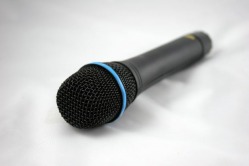
You're ready to do a professional recording after you've found a talent and have made a script. Doing a recording might seem daunting however there are some computer softwares that will provide you the tools you need to craft the whole project on your own even without the help of a videographer or a production team.
There is a significant amount of preparation required to ensure that the environment in which you record the voice over will help you create a quality piece. Here are some essential tips when preparing the room for your voiceover recording:
1. Test your equipments. Having your talents on standby waiting for a faulty equipment setup to be fixed will cost you time and even money if you book them by the hour. Make sure you get the right equipment for the job and test them well ahead of production day, says Jay Rose, the author of "Producing Great Sound for Digital Video". You have to go as far as testing them hours before your actual production to make sure your project goes without a hitch.
2. Test a room for echoes. You can find out if a room creates an echo effect by doing some test records in it. Close all doors, windows and check all your equipments to eliminate or at least minimize echoes.
3. Use background music if necessary. A professionally done recording must not contain any white noise. This is specially true for a narration wherein the viewer must sense that the narrator is directly in front and having a conversation with them. If the white noise goes beyond an acceptable level, you should definitely think about adding a background music.
4. Find the best position in the room for the recording. There are no rules about where to position the microphone, so feel free to move the mic setup into different areas of the room to get the right sound. You don't want to record when the sounds seem hollow or filtered in any way. Move around to find the best fit.
5. Ignore outside noises and minute sounds. In reality, anything can affect the quality of your voiceover recordings, from lightning fixtures to everyday outside traffic. The truth is most mics are not that sensitive to pick-up these noises. If these noises go through your recording, purchase a high-pass filter for your microphone for finer voiceovers.
6. Turn off fans and blowers. This will be an issue if you're recording in a cramped room. Turn off computers, air conditioners and other devices with fans as these affect the air turbulence of a room. It does not mean you can't use them, just turn them off when the mics are on.
As a final advice, oversee your production using a pair of headphones. Go to a different room and make use of playback functions to hear mistakes as soon as possible. This will save you a lot of time as it allows you to address audio quality issues on the recording day itself.
There is a significant amount of preparation required to ensure that the environment in which you record the voice over will help you create a quality piece. Here are some essential tips when preparing the room for your voiceover recording:
1. Test your equipments. Having your talents on standby waiting for a faulty equipment setup to be fixed will cost you time and even money if you book them by the hour. Make sure you get the right equipment for the job and test them well ahead of production day, says Jay Rose, the author of "Producing Great Sound for Digital Video". You have to go as far as testing them hours before your actual production to make sure your project goes without a hitch.
2. Test a room for echoes. You can find out if a room creates an echo effect by doing some test records in it. Close all doors, windows and check all your equipments to eliminate or at least minimize echoes.
3. Use background music if necessary. A professionally done recording must not contain any white noise. This is specially true for a narration wherein the viewer must sense that the narrator is directly in front and having a conversation with them. If the white noise goes beyond an acceptable level, you should definitely think about adding a background music.
4. Find the best position in the room for the recording. There are no rules about where to position the microphone, so feel free to move the mic setup into different areas of the room to get the right sound. You don't want to record when the sounds seem hollow or filtered in any way. Move around to find the best fit.
5. Ignore outside noises and minute sounds. In reality, anything can affect the quality of your voiceover recordings, from lightning fixtures to everyday outside traffic. The truth is most mics are not that sensitive to pick-up these noises. If these noises go through your recording, purchase a high-pass filter for your microphone for finer voiceovers.
6. Turn off fans and blowers. This will be an issue if you're recording in a cramped room. Turn off computers, air conditioners and other devices with fans as these affect the air turbulence of a room. It does not mean you can't use them, just turn them off when the mics are on.
As a final advice, oversee your production using a pair of headphones. Go to a different room and make use of playback functions to hear mistakes as soon as possible. This will save you a lot of time as it allows you to address audio quality issues on the recording day itself.
 RSS Feed
RSS Feed